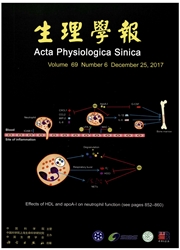

 中文摘要:
中文摘要:
本研究旨在探讨阿片受体在慢性间歇性低压低氧(chronic intermittent hypobaric hypoxia, CIHH)增强大鼠胸主动脉舒张中的作用及其机制。雄性成年Sprague-Dawley (SD)大鼠随机分为2组:CIHH组和对照组。CIHH组大鼠置于低压氧舱,接受28 d模拟5 000 m高原,每天6 h的低压低氧处理。对照组大鼠不给予CIHH处理。常规制备胸主动脉环,通过离体动脉环灌流和描记方法记录动脉的舒张活动,Western blot法检测主动脉δ、μ及κ阿片受体表达。结果显示:(1) 与对照组相比,CIHH可浓度依赖性地增强乙酰胆碱诱发的大鼠胸主动脉环舒张(P 〈 0.05);(2) CIHH对胸主动脉环舒张的增强效应可被阿片受体非特异性阻断剂纳洛酮所阻断;(3) CIHH可使胸主动脉δ、μ及κ阿片受体表达上调;(4) CIHH对胸主动脉环舒张的增强效应,可被ATP敏感钾通道(ATP-sensitive potassium channel, KATP)阻断剂格列苯脲所阻断。结果提示,CIHH处理可增强大鼠胸主动脉的舒张,此作用可能通过激活阿片受体和开放KATP通道所实现。
 英文摘要:
英文摘要:
The present study was designed to investigate the role of opioid receptors in the vasorelaxation effect of chronic intermittent hypobaric hypoxia (CIHH) in thoracic aorta rings and the underlying mechanism in rats. Adult male Sprague-Dawley (SD) rats were randomly divided into 2 groups: CIHH treatment group and control group. The rats in CIHH group were exposed to hypoxia in a hypobaric chamber (simulated 5 000 m altitude) for 28 days, 6 h per day. The rats in control group were kept in the same environment as CIHH rats except no hypoxia exposure. The relaxation of thoracic aorta rings was recorded by organ bath perfusion technique, and expression of opioid receptors was measured by Western blot. Results are shown as follows. (1) The acetylcholine (ACh)-induced endothelium-dependent relaxation of thoracic aorta in CIHH rats was increased obviously in a concentration-dependent manner compared with that in control rats (P 〈 0.05). (2) This enhancement of ACh-induced relaxation in CIHH rats was abolished by naloxone, a non-specific opioid receptor blocker (P 〈 0.05). (3) The expressions of δ, μ and κ opioid receptors in thoracic aorta of CIHH rats were up-regulated compared with those in control rats (P 〈 0.05). (4) The enhancement of CIHH on relaxation of thoracic aorta was reversed by glibenclamide, an ATP-sensitive potassium channel (KATP) blocker (P 〈 0.05). The results suggest that opioid receptors are involved in CIHH-enhanced ACh-induced vasorelaxation of thoracic aorta through KATP channel pathways.
 同期刊论文项目
同期刊论文项目
 同项目期刊论文
同项目期刊论文
 Enhancement of Chronic Intermittent Hypobaric Hypoxia Adaptation on Cardiac Protection of Anandamide
Enhancement of Chronic Intermittent Hypobaric Hypoxia Adaptation on Cardiac Protection of Anandamide Intermittent Hypobaric Hypoxia Preconditioning Induced Brain Ischemic Tolerance by Up-Regulating Gli
Intermittent Hypobaric Hypoxia Preconditioning Induced Brain Ischemic Tolerance by Up-Regulating Gli Chronic Intermittent Hypobaric Hypoxia Attenuates Depressor Response through Facilitation of Baroref
Chronic Intermittent Hypobaric Hypoxia Attenuates Depressor Response through Facilitation of Baroref 期刊信息
期刊信息
